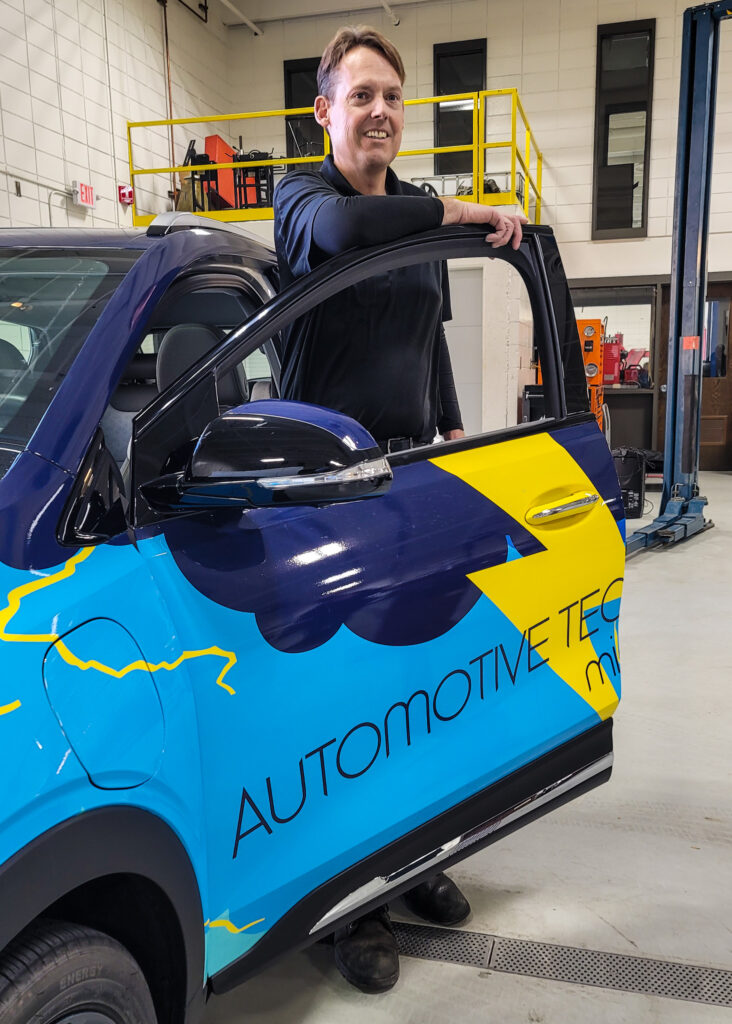
Auto tech instructor Shannon Mohn is developing the new EV technician curriculum at M State.
Electric vehicle sales are rapidly picking up speed. This year, they’re moving off dealers’ lots even faster than gas-powered automobiles. Yet only 3% of auto technicians are trained to repair them.
Now M State – Minnesota State Community and Technical College here in Moorhead – is building one of the nation’s first college programs to fill that growing need … taking the lead with a brand-new initiative to provide professionals to close that yawning gap.
“Five years ago, I was very much a skeptic about EVs,” says Shannon Mohn, the automotive tech instructor who wrote the $350,000 National Science Foundation grant that M State announced last week. “I didn’t pay much attention. Then I took a drive in a friend’s Tesla, and I fell in love.”
Together with fellow instructor Allan Lineburg, Mohn is leading the Moorhead campus’s campaign to prepare auto techs to repair the growing number of EVs pulling onto local streets and highways. The two are creating a brand-new EV repair curriculum for high school and college automotive education — a course of study and E-textbook that will one day be available free to college and high school automotive education programs from coast to coast.
M State, Mohn says, will position its EV education as a supplement to its existing two-year program in automotive technology. Envisioned as a four- to eight-week course of study, it will be stacked onto the background students already gain in every aspect of gas-powered engines. The course — expected to be introduced at least by the summer of 2024 — will be open not only to current M State students, but to technicians already in the field.
He spent part of the summer learning the trade himself at two of the nation’s top programs designed to train the trainers, EV Professional Plus in Portland, Oregon, and ACDC Hybrid Electric of Boston. Interest in the training he’ll be designing is already running high. Mohn has already been contacted by a Minneapolis utility company asking for all the seats in the first class. His response: “Too soon to tell.” Stay tuned.
“As soon as mainstream auto manufacturers like Ford and GM got involved, we could see the need for training was coming on fast,” Mohn points out. “They’re doing training of their own, but their focus is on replacement of parts. Ours will be a little different. We’re going to concentrate on repair.”
Media coverage of EVs has tended to focus on the cost of replacing the large battery that powers the car, said to range up to $20,000. That’s short-sighted, Mohn says: “Every part in that battery has a part number. Everything can be repaired, and at a cost of hundreds rather than thousands of dollars.” While availability has lagged, those parts are now being fast-tracked into the inventories of the auto parts aftermarket.
The drive to implement EV technology training at M State began nearly a year ago when the director of MSCTC’s Transportation Center of Excellence suggested Mohn apply for the NSF’s Mentor Connect, which prepares faculty for writing and implementing grants in science and technology. “It was a long shot. Only 30 are selected for its groups. I sent my application in just two hours before the closing deadline,” he remembers. “When I got the call a couple weeks later that I’d been accepted, I hadn’t even told our deans.”
The automotive service instructor already knew the topic of the grant he’d eventually submit — electrical vehicle training.
“The competition for those grants is ferocious,” he says, “and I was pretty sure there was a very low probability of getting one.” But he was wrong. The M State grant scored a perfect four stars among all the reviewers, and the project was a go.
For Mohn, training service techs to repair and maintain the burgeoning number of EVs on the road is more than an educational calculation. It is also something of a personal mission. “I have pulmonary fibrosis, and I’m three years out past a double lung transplant,” he explains. “One thing on my personal bucket list is doing something to clean things up.”
Emission-free technology neatly fills that bill. Besides advocating for the service tech program and M State’s purchase of two EVs for the program — including its Chevy Bolt boldly emblazoned with the college’s name — the instructor ordered his own electrical- powered Mach-E Mustang 13 months ago.
His sleek black beauty was finally delivered a few weeks ago, putting all the power of the emerging technology in his own garage. “You’d have to pry it out of my dead, cold hands,” he asserts. “Once you drive an EV, you’re hooked from the get-go. So smooth! So powerful! You get instant acceleration, instant torque. When you step on the go pedal” [the EV equivalent of the “gas pedal”] “it throws everybody back in their seats.”
M State’s NSF grant supports not only development of its training curriculum but also installation of a level 3 charging station on the campus and purchase of the limited amount of equipment that must be added — primarily insulated tools and a table lift to handle batteries weighing 2,000 pounds or more. “These batteries are huge,” he says. “They’re the whole floor of the car.” As a side benefit, the big, flat batteries make EVs more stable: “All of these cars have five-star safety ratings.”
M State Dean Marsha Weber observes that the new EV service technology program is a perfect fit for the college’s commitment to innovations in technical education. “Even without the NSF money, this is the type of program that we’d invest in. It’s exactly what we’re looking for.” She pauses and smiles. “Of course, the grant certainly helps.”


